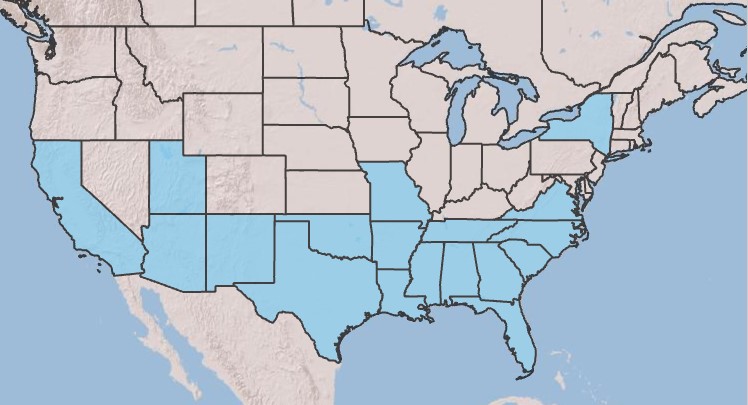Difference between revisions of "Melia azedarach"
(→Taxonomic Notes) |
(→Ecology) |
||
| Line 28: | Line 28: | ||
==Distribution== | ==Distribution== | ||
==Ecology== | ==Ecology== | ||
| − | + | ===Habitat=== | |
| + | ''M. azedarach'' will occur in ecosystems such as pine-oak forests, pine-oak-beech-magnolia woods, bottomland woodlands, floodplain forests, streambanks, river sandbars, marshy shores, and coastal spits. It will also readily grow in areas with soil disturbance such as fields, vacant lots, forest edges, ruderal areas, ditches, fencerows, and roadsides. ''M. azedarach'' can tolerate dry to wet conditions, and it is often found in sand or sandy loam.<ref name = fsu> Florida State University Robert K. Godfrey Herbarium database. URL: http://herbarium.bio.fsu.edu. Last accessed: June 2023. Collectors: Loran C. Anderson, George R. Cooley, J. P. Gillespie, Robert K. Godfrey, Walter Kittredge, Gary R. Knight, Karen MacClendon, Travis MacClendon, Richard S. Mitchell, J. B. Nelson, Dana Sakole, Kenneth A. Wilson, and Carroll E. Wood Jr. States and counties: Florida: Calhoun, Citrus, Franklin, Gulf, Hamilton, Holmes, Jackson, Jefferson, Lake, Leon, Liberty, and Wakulla.</ref> | ||
<!--===Phenology===--> <!--Timing off flowering, fruiting, seed dispersal, and environmental triggers. Cite PanFlora website if appropriate: http://www.gilnelson.com/PanFlora/ --> | <!--===Phenology===--> <!--Timing off flowering, fruiting, seed dispersal, and environmental triggers. Cite PanFlora website if appropriate: http://www.gilnelson.com/PanFlora/ --> | ||
<!--===Seed dispersal===--> | <!--===Seed dispersal===--> | ||
Revision as of 13:13, 19 June 2023
| Melia azedarach | |
|---|---|
| Scientific classification | |
| Kingdom: | Plantae |
| Division: | Magnoliophyta - Flowering plants |
| Class: | Magnoliopsida - Dicotyledons |
| Order: | Sapindales |
| Family: | Meliaceae |
| Genus: | Melia azedarac |
| Species: | M. azedarach |
| Binomial name | |
| Melia azedarach Linnaeus | |

| |
| Natural range of Melia azedarach from USDA NRCS [1]. | |
Common name: Chinaberrytree, Carolina mahogany, umbrella tree, pride of India, white cedar, Persian lilac
Contents
Taxonomic Notes
Synonyms: none[1]
Varieties: none[1]
Description
Distribution
Ecology
Habitat
M. azedarach will occur in ecosystems such as pine-oak forests, pine-oak-beech-magnolia woods, bottomland woodlands, floodplain forests, streambanks, river sandbars, marshy shores, and coastal spits. It will also readily grow in areas with soil disturbance such as fields, vacant lots, forest edges, ruderal areas, ditches, fencerows, and roadsides. M. azedarach can tolerate dry to wet conditions, and it is often found in sand or sandy loam.[2]
Conservation, cultivation, and restoration
Cultural use
Photo Gallery
References and notes
- ↑ 1.0 1.1 Weakley, A.S. 2020. Flora of the Southeastern United States. Edition of 20 October 2020. University of North Carolina at Chapel Hill, Chapel Hill, North Carolina.
- ↑ Florida State University Robert K. Godfrey Herbarium database. URL: http://herbarium.bio.fsu.edu. Last accessed: June 2023. Collectors: Loran C. Anderson, George R. Cooley, J. P. Gillespie, Robert K. Godfrey, Walter Kittredge, Gary R. Knight, Karen MacClendon, Travis MacClendon, Richard S. Mitchell, J. B. Nelson, Dana Sakole, Kenneth A. Wilson, and Carroll E. Wood Jr. States and counties: Florida: Calhoun, Citrus, Franklin, Gulf, Hamilton, Holmes, Jackson, Jefferson, Lake, Leon, Liberty, and Wakulla.